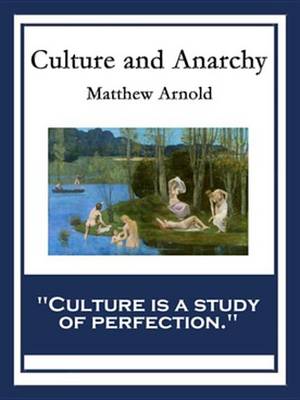Reviewed by brokentune on
Matthew Arnold's Culture and Anarchy was an odd book to come back to in these times of talk about making things "great" again. I had first read the book way back when I was at university. Back then, I read the book with the purpose of finding arguments for and against different aspects of "culture" and whatever that meant, but I never got the time to read what Arnold actually had to say beyond his eternal buzzwords of "sweetness and light", both which are still as vague as ever.
Having revisited with Arnold over the past couple of weeks, the best I can say is that I am glad I have read the book without the pressing agenda of writing a piece of coursework about it. There are a lot of sides to Arnold's writing that are worth exploring - tho, his sometimes tongue-in-cheek style of narration has left me wondering more than a few times which point he was trying to make.
Just like the quote about greatness could be interpreted to mean all things to all people, Arnold's argumentation by use of fictional characters (and few real ones) generalised his ideas so much, that for most of the book I was left wanting to shout at him: "But where is your proof? Where are your sources for making this claim? What evidence have you to support your claim?"
And this was true even more so with the points I wanted to agree with, than it was with the sketchy claims I was looking to refute. It sounds great to hear Arnold use such flowery rhetoric like:
"It is in making endless additions to itself, in the endless expansion of its powers, in endless growth in wisdom and beauty, that the spirit of the human race finds its ideal. To reach this ideal, culture is an indispensable aid, and that is the true value of culture." Not a having and a resting, but a growing and a becoming, is the character of perfection as culture conceives it; and here, too, it coincides with religion. And because men are all members of one great whole, and the sympathy which is in human nature will not allow one member to be indifferent to the rest, or to have a perfect welfare independent of the rest, the expansion of our humanity, to suit the idea of perfection which culture forms, must be a general expansion.
But where are his examples?
It sounds great to hear Arnold refer to "men are all members of one great whole" but in the same line of argument, he becomes divisive, too, when referring to the members of the working class not knowing what they want, to members of the middle class as wanting the wrong thing, to the members of the aristocracy as being too remote and not intervening enough in the frivolous pursuit of industry, to Philistines and Barbarians. But most divisively of all, Arnold seems to restrict the benefit of the application of "culture" as he saw it to the English.
"In the first place, it never was any part of our creed that the great right and blessedness of an Irishman, or, indeed, of anybody on earth except an Englishman, is to do as he likes; and we can have no scruple at all about abridging, if necessary, a non-Englishman's assertion of personal liberty. The British Constitution, its checks, and its prime virtues, are for Englishmen. We may extend them to others out of love and kindness; but we find no real divine law written on our hearts constraining us so to extend them."
Sarcasm? Or true sentiment? It depends on the reader's own outlook and interpretation. There is a fine line in Arnold's argument that can be used or abused for and against nationalism, for and against religion, for and against liberalism, etc. but left me with a general sense of puzzlement about whether any of Arnold's points had actually carried any momentum other than to promote the ever-so-wishy-washy phrase of "Sweetness and Light"?
"Now, the use of culture is that it helps us, by means of its spiritual standard of perfection, to regard wealth as but machinery, and not only to say as a matter of words that we regard wealth as but machinery, but really to perceive and feel that it is so. If it were not for this purging effect wrought upon our minds by culture, the whole world, the future as well as the present, would inevitably belong to the Philistines. The people who believe most that our greatness and welfare are proved by our being very rich, and who most give their lives and thoughts to becoming rich, are just the very people whom we call the Philistines. Culture says: "Consider these people, then, their way of life, their habits, their manners, the very tones of their voice; look at them attentively; observe the literature they read, the things which give them pleasure, the words which come forth out of their mouths, the thoughts which make the furniture of their minds; would any amount of wealth be worth having with the condition that one was to become just like these people by having it?"
By the end of the book, I was left craving for a more modern and more scientific approach to dissecting "culture" for all that it means, because while Arnold was (and to some extent still seems to be) celebrated for his efforts on defining culture, his efforts are limited to his own personal views with little to show any credentials of research or actual knowledge of society, history, or any other fields remotely relating to what we would now class as sociology, cultural studies, anthropology, etc.
Nevertheless, if you're looking to dig into the mindset of a high-Victorian Englishman, Culture and Anarchy does make for an entertaining, tho slightly painful visit.
Reading updates
- Started reading
- 3 February, 2017: Finished reading
- 3 February, 2017: Reviewed
